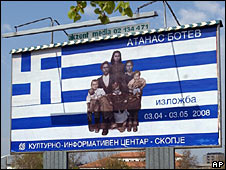Greece has warned Macedonia [sic] that its hopes of joining Nato could be damaged by a poster which has appeared in the Macedonian [sic] capital Skopje.
The poster, advertising a private art exhibition, features the Greek flag with the cross replaced by a swastika.
Greece has already threatened to veto Macedonia's [sic] Nato bid if a dispute about the name "Macedonia" is not resolved.
The Macedonian [sic] government expressed regret over the poster, after Greece made an official diplomatic complaint.
The Greek ambassador to Washington, Alexandros Mallias, complained about the poster in a letter to President George Bush, Secretary of State Condoleezza Rice and Jewish organisations in the US.
"The picture of the Greek flag defaced by the Nazi swastika replacing the cross is deeply offensive and insulting to the patriots and heroes, Greeks and Americans alike, who gave their lives fighting Nazism and Fascism during World War II," he wrote.
In an interview with the Associated Press, Mr Mallias said the poster was "the product of the aggressive and hostile propaganda that the government in Skopje has been propagating in Greece."
"Can you imagine a country that aspires to be a Nato member in 48 hours tolerating such propaganda?" he went on.
Nato is due to decide on Macedonia's [sic] membership bid on Thursday at the summit in Bucharest.
Greece has previously said it would veto membership, if the two countries fail to resolve a dispute over the Former Yugoslav Republic of Macedonia's name.
Greece argues that use of the name "Macedonia" implies territorial claims on the adjoining Greek province of the same name - but Skopje rejects the argument.
The Macedonian [sic] government disassociated itself from the poster, but said it would not meddle with freedom of expression.
Source:
BBC news
The poster, advertising a private art exhibition, features the Greek flag with the cross replaced by a swastika.
Greece has already threatened to veto Macedonia's [sic] Nato bid if a dispute about the name "Macedonia" is not resolved.
The Macedonian [sic] government expressed regret over the poster, after Greece made an official diplomatic complaint.
The Greek ambassador to Washington, Alexandros Mallias, complained about the poster in a letter to President George Bush, Secretary of State Condoleezza Rice and Jewish organisations in the US.
"The picture of the Greek flag defaced by the Nazi swastika replacing the cross is deeply offensive and insulting to the patriots and heroes, Greeks and Americans alike, who gave their lives fighting Nazism and Fascism during World War II," he wrote.
In an interview with the Associated Press, Mr Mallias said the poster was "the product of the aggressive and hostile propaganda that the government in Skopje has been propagating in Greece."
"Can you imagine a country that aspires to be a Nato member in 48 hours tolerating such propaganda?" he went on.
Nato is due to decide on Macedonia's [sic] membership bid on Thursday at the summit in Bucharest.
Greece has previously said it would veto membership, if the two countries fail to resolve a dispute over the Former Yugoslav Republic of Macedonia's name.
Greece argues that use of the name "Macedonia" implies territorial claims on the adjoining Greek province of the same name - but Skopje rejects the argument.
The Macedonian [sic] government disassociated itself from the poster, but said it would not meddle with freedom of expression.
Source:
BBC news





 RSS Feed
RSS Feed